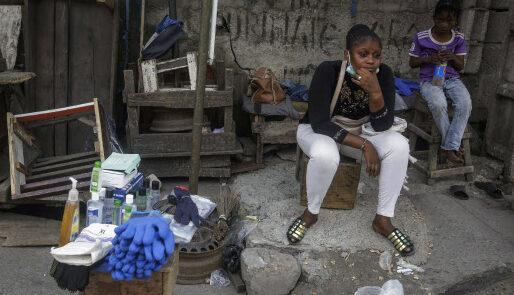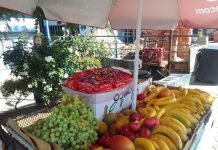Africa-Press – Lesotho. The streets of Lagos, like those of all major African cities, provide full evidence of the immense contribution of street vendors and gig workers to the vibrancy of Africa’s economic life.
African cities are teeming with market stalls of all sorts, ranging from the celebrated suya stands (selling popular spiced up grilled beef) to the indispensable mobile phone booths (allowing customers to rent a mobile phone for a call in exchange for a fee) and the oft-deplored regiments of motorcycle taxis.
These workers are typically unregistered, unregulated and untaxed. In the lingo of economists, they belong to the informal or traditional sector. In Africa, informal workers represent a whopping 86% of all jobs.
In Sub-Saharan Africa specifically, they contribute 38 percent of GDP and up to 60% of Nigeria’s GDP.
Like other parts of the economy, the informal sector has taken a hit from the COVID-19 crisis. Governments have mandated workers to take costly protective measures, such as the regular purchase of masks, the reduction in the number of passengers for motorcycle taxis, or the observance of curfews. Farmers have seen falling demand for their produce as restaurants have reduced their purchases in the face of dwindling traffic.
Whilst policymakers in Spain and France have been toying with the idea of a universal basic income that would extend a safety net to virtually all those unemployed (regardless of whether they qualify for traditional unemployment benefits), policymakers on the continent have done little to extend concrete support to the millions of unregistered workers who keep Africa’s market stalls, work on its farms or toil in its workshops.
Governments should inject capital into African tontines …in a country like Cameroon, up to 50% of the population participates in tontines or other parts of the informal financial system.
In one of the great ironies of the crisis, no focused support has been directed towards the shadow economy in the very continent that depends the most on it.
That point doesn’t take away from the fact that African governments have been uncharacteristically responsive to the pandemic. Some of these responses have included free testing and COVID-19 treatment, reduced collections of taxes and customs duties, as well as food distribution.
These efforts are commendable but insufficient. African governments need a targeted set of relief measures for the continent’s informal economy. Such a stimulus programme is especially appropriate, considering the role that government containment measures played in bringing about the near collapse of that sector of the economy.
These workers must be protected from the devastating effects of the COVID-19 crisis, because of their critical contribution to African economies, their importance to Africa’s food security and their vulnerability to economic shocks.
Africa’s informal sector witnessed significant growth over the past decades, aided by a combination of technological and macro-economic trends. The advent of mobile phones and easy access to motor cycles facilitated the creation of hundreds of thousands of informal jobs in the 2000s.
Two decades prior, Structural Adjustment Programs led to the closing of many state-run industries, forcing many former public employees to find work in the underground economy.
Currently, the COVID-19 crisis is also threatening to destroy more jobs in the formal economy thereby pushing additional workers towards the informal route.
Today’s challenges present a unique chance to make lemonade out of lemons, by laying the foundation of a stronger and more resilient Africa. Informal workers are also critical to the uninterrupted supply of food to African consumers.
In East Africa for example, the combination of COVID-19 and ongoing locust invasions have threatened the livelihoods of those in the farming sector and also the food supply to citizens.
These are the people the government needs to support. Informal workers remain an economically vulnerable sector of our societies. They often lack sufficient savings so their livelihood depends on each day’s earnings.
In recognition of the Cornelian dilemma of “contagion or starvation”, many African countries have hastily tapered off initial restrictions of movement.
However, merely allowing people to go back to work does not guarantee the return of customers concerned for their health; nor does it compensate workers for weeks of inactivity.
The intersection of poverty and gender inequality adds another layer of vulnerability to the countless women who are part of Africa’s informal sector.
With 90% of women across Africa employed in the informal sector, COVID-19 threatens their economic self-sufficiency and dignity that they have traditionally derived from plying their trade and contributing to the livelihood of their household.
Several measures should be taken in order to extend a life raft to Africa’s battered informal workers: Africa’s aim in navigating the COVID-19 crisis ought to be not merely preservation but amelioration; not simply a return to normalcy but the improvement of standards of living.
The unfolding crisis presents a unique opportunity to reshape the continent by bringing a large number of informal workers out of the shadows, something that has eluded policymakers on the continent for decades.
In order to qualify for the many proposals I have written about, informal workers would need to register with State agencies. These registration records could later serve to expand the national tax base, putting the continent on stronger fiscal footing post-crisis.
This approach would also enable governments to regulate the informal sector and rectify longstanding issues therein (lack of consumer welfare protection, inadequate workers’ safety and child labour just to name those few).
President Obama’s former chief of staff, Rahm Emmanuel was fond of saying: “[One] should never let a good crisis go to waste. ” Today’s challenges present a unique chance to make lemonade out of lemons, by laying the foundation of a stronger and more resilient Africa.
For More News And Analysis About Lesotho Follow Africa-Press






